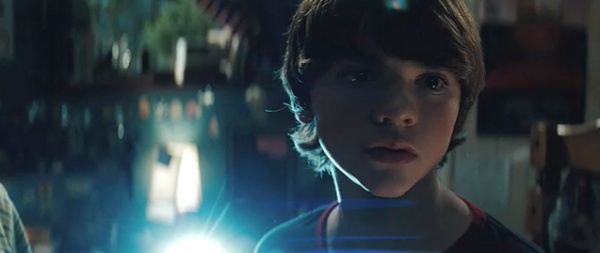2011 // USA // J. J. Abrams // June 23, 2011 // Theatrical Projection (St. Louis Cinemas Moolah Theater)
On the surface, Super 8 strives--almost urgently, one might say--to position itself as the scary-yet-sweet successor to the 1970s and early 80s science fiction and fantasy films of Steven Spielberg. Both Close Encounters of the Third Kind and E.T. are the clearest antecedents for J.J. Abrams' tale of alien menace in the Heartland, although the film also draws from Jaws and an assortment of seminal blockbusters for which Spielberg served as writer and producer: Poltergeist, Gremlins, Back to the Future, and The Goonies. Abrams' film possesses a reverence for families (natural and surrogate) and a sentimental regard for childhood's joys and struggles that feels positively old school, in part because it approaches those elements sincerely, just as Spielberg did--and still does, on occasion.
The 1979 small-town setting has an undeniable charm as expressed through Martin Whist's rich production design, and Abrams himself capably blends realism and nostalgia in his portrayal of this bygone/never-was Middle America. The film's affectionate depiction of breakfast table chaos and summer vacation tomfoolery provides a substrate of normalcy for the otherworldly story, while also tipping its hat to the milieu of its cinematic predecessors. Of course, said depictions also tickle the wistful pangs of thirty-something moviegoers who are likely to respond positively to evocations of the influential blockbusters of their youth. Heck, I'm tempted to charge Super 8 with outright pandering to Spielberg himself, given that the pre-teen protagonists are aspiring 8 mm filmmakers who blow up a model train for their zombie-noir short. Gee, who does that sound like? And guess who has a producer credit on Super 8?
Abrams hasn't yet developed any distinguishing characteristics as a director, excepting his odd and distracting obsession with lens flare, but Super 8's creepshow theatrics are consistent with similar approaches in the Abrams-produced Lost and Cloverfield. Namely, the film does a maddeningly fine job of keeping its monster out of sight for as long as is practicable. Unlike Cloverfield's ghastly behemoth, however, the creature design of Super 8's alien isn't that distinctive from that of a thousand other science fiction critters. It's a bit of a letdown, therefore, when the film finally gives the viewer a good, long look: fearsome and appropriately unearthly, sure, but not particularly memorable.
The film admittedly pulls off some jaw-dropping set pieces, with the genuinely frightening train derailment that caps the first act serving as a high-water mark. Unfortunately, the screenplay, penned by the director, is riddled with modest but distracting blemishes. Several plot points vanish without even a nod of acknowledgement. Abrams still seems to have a meager grasp of the rhythms of cinematic storytelling, a flaw revealed in the capricious quality to the story's structure. (Why this scene then that scene?) The film shifts away from the viewpoint of its junior high heroes too frequently, which has the unfortunate effect of rendering their fumbling a little boring. I'm thinking particularly of a scene where the kids watch a secret government film that reveals little the viewer of Super 8 didn't already know or could safely assume.
These defects notwithstanding, there's a straightforward, good-natured quality to Super 8 that goes beyond the elementary appeal of its Our Gang Meets Alien premise. Despite a $45 million budget and cutting-edge special effects, the film has the confidence of a one-off entertainment without overfed ambitions. That used to be the norm even for summer blockbusters, but in this era of endless, lifeless franchise Hollywood filmmaking, there's a kind of noble simplicity to it. Super 8 has the refreshing tone of a feature-length episode of The Twilight Zone or Spielberg's own Amazing Stories, a creature feature bauble that is eagerly aware of its pedigree and yet also contently self-contained.




